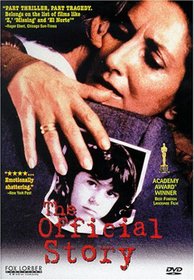| Actors: Norma Aleandro, Hector Alterio, Chunchuna Villafañe, Hugo Arana, Guillermo Battaglia Director: Luis Puenzo Creators: Félix Monti, Luis Puenzo, Juan Carlos Macías, Marcelo Piñeyro, Rolando Epstein, Óscar Kramer, Aída Bortnik Genres: Indie & Art House, Drama, Mystery & Suspense, Military & War Sub-Genres: Indie & Art House, Drama, Mystery & Suspense, Military & War Studio: Fox Lorber Format: DVD - Color,Full Screen DVD Release Date: 11/24/1998 Original Release Date: 11/08/1985 Theatrical Release Date: 11/08/1985 Release Year: 1998 Run Time: 1hr 52min Screens: Color,Full Screen Number of Discs: 1 SwapaDVD Credits: 1 Total Copies: 0 Members Wishing: 10 MPAA Rating: R (Restricted) Languages: Spanish Subtitles: English See Also: |
Search - The Official Story on DVD
  | The Official Story Actors: Norma Aleandro, Hector Alterio, Chunchuna Villafañe, Hugo Arana, Guillermo Battaglia Director: Luis Puenzo Genres: Indie & Art House, Drama, Mystery & Suspense, Military & War R 1998 1hr 52min This is one of those rare political films that transcend politics with a stirring emotional story. Argentinean first-time director Luis Puenzo tells the story of a strong-willed teacher who tries to learn the true identity... more » |
Larger Image |
Movie DetailsSimilar Movies
Similarly Requested DVDs
|
Movie ReviewsThe Story Of Us Orlando Avila Blas | Argentina | 09/05/2001 (5 out of 5 stars) "As and argentinian citizen, I think this is the one of the most representative film about us, ever made. The screenplay shows in a very close way, the dark years of our history, when democracy was just a dream. Norma Aleandro and Hector Alteiro are simply perfect in their roles and the music of Atilio Stampone is oustanding. The first (and by the moment, the only) Oscar for Best Foreing Language Film, to Argentina. I'm really proud that people around the world could appreciate this magnificent film." A flawless masterpiece Alejandra Vernon | Long Beach, California | 09/04/2000 (5 out of 5 stars) "Very few films have reached this level of excellence. This multiple award winner (Oscar, Cannes, etc.), is magnificently directed by Luis Puenzo and superbly acted by everyone in the cast (Norma Leandro is extraordinary). The beauty of the cinematography, with its sharp contrasts of red and blue, the editing, the script...it's all a marvel.One of the things this film is about is how the truth can unravel a seemingly "perfect" situation when it's based on wrong motives and actions.This film will capture you...you won't just watch it, you'll live it. Don't miss this incredibly powerful cinematic experience." La Historia Oficial as a teaching tool Marianna Ponti | Bolingbrook, Illinois USA | 09/23/2004 (5 out of 5 stars) "I used this film in my upper level high school Spanish class. The students, without exception, immediately became emotionally involved with the characters and the powerful story line. They could not believe this was a part of history they were not aware of and even questioned their history teachers as to why there is no mention of this in their classrooms. Along with the movie, we did extensive research on the "desaparecidos" and they read a few real stories of children who had been "adopted" only to find out as adults that their entire life had been a lie. What surprised my students most of all was the relatively lenient treatment the perpetrators of this heinous crime received after being found guilty. This movie, and topic, is suitable for an upper level high school class (4th year and up). I recommend that you prepare the students beforehand by doing some research on the topic and period of Argentinian history. It would also be valuable to research the link between the military dictator of Argentina at the time and the government of the U.S." A moving story, with subtlety, emotion, and truth. Alejandra Vernon | 11/04/1999 (4 out of 5 stars) "The military juntas in Argentina had methods similar to those of Pinochet in Chile and Castro in Cuba. You will see in this movie how Argentine society wretched at the numerosity of the families suffering losses. You will see the "abuelas de la Plaza de Mayo," protesting in a way never seen before. But the uniqueness of this film lies in its portrayal of how an unlikely family finds that it, too, has fallen victim, in an unexpected way, in the wake of a secretly brutal regime.The movie is poignant in another way: very subtlely, it portrays how an average man in the government, a husband who loves his wife and daughter dearly, is himself changed, profoundly, through his association with the government (a government willing to hurt its citizens in order to battle a threatening ideology). The slow, subtle build-up of a tension that must be resolved, and the crescendo in the final scenes, are moving. In the end, in its portrayal of a particular case (Argentina), this movie holds a mirror to human nature, showing us both the depths, as well as the heights, which men and women can reach.This appears to be one of the best Argentine films made in the '80s. I think it shows that Argentine filmmaking is alive and well. If you like this movie, I would also recommend another Argentine film: Man Facing Southeast, a more reflective, philosophical movie, with a very subtle religious interrogative, probing the question of who we are as human beings."
|















